Jet mills are vital in many industries. They can reduce particle size with great precision. Choosing the right jet mill for specific needs is crucial for peak performance. This guide delves into essential factors to consider when purchasing a jet mill.
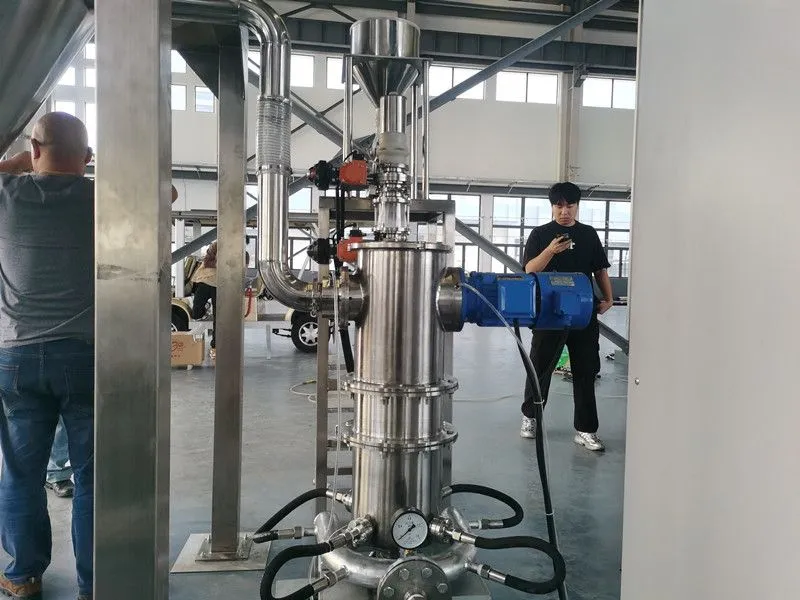
What is a Jet Mill?
A jet mill is a type of milling equipment. It uses high-speed jets of compressed air, steam, or gas to accelerate particles. Jet mill reduces their size by causing collisions. It works by feeding the material into the milling chamber. There, jets create intense turbulence. It grinds materials to very fine sizes, often 1 to 10 microns.
A key difference between jet mills and other technologies, like ball or hammer mills, is that jet mills have no moving parts. Jet mills use aerodynamic forces, not physical impact. This reduces contamination and preserves the material’s properties. So, they’re suitable for sensitive applications.
Applications of Jet Mills
Jet mills find widespread use across industries like pharmaceuticals and food processing. They excel at processing materials like powders, pigments, and ceramics with great precision.
1. Pharmaceuticals: Jet mills make fine powders of active pharmaceutical ingredients (APIs). They require a precise particle size for better bioavailability and efficacy. They are also used in the formulation of inhalable drugs.
2. Food Industry: In food processing, jet mills are used to micronize spices, flavorings, and food additives. This ensures uniformity in particle size, which can enhance flavor and texture.
3. Chemical Industry: Jet mills grind pigments, dyes, and other chemicals. This achieves a desired particle size for better dispersion in solvents and matrices.
4. Minerals and Metals: They grind minerals, like talc and silica, and metals, like aluminum, into fine powders. These are used in coatings and composites.
5. Aerospace and Defense: Jet mills can make fine powders of high-performance materials, like ceramics and advanced composites, for aerospace and defense use.
6. Electronics: The industry uses jet mills to make fine powders for capacitors, batteries, and other components. Specific particle sizes are critical for performance.
7. Cosmetics: Jet mills create fine powders for cosmetics and personal care products. They ensure a smooth texture and even pigment distribution.
8. Additive Manufacturing: Jet milling makes fine metal and polymer powders for 3D printing. Particle size and distribution greatly affect the printing process and product quality.
9. Agriculture: Jet mills can micronize fertilizers and pesticides. This improves their effectiveness and distribution when applied to crops.
10. Nanotechnology: Jet mills are used to make nanomaterials. They must precisely control particle size and shape for drug delivery and advanced materials.
Key Factors to Consider When Purchasing a Jet Mill
Material Compatibility
Different jet mills are suited for processing various materials. Considerations for abrasive, heat-sensitive, or hygroscopic materials are crucial to ensure efficient operation. Purchasing a jet mill requires more consideration
Desired Particle Size and Distribution
Particle size plays a pivotal role in numerous applications. Know the importance of controlling particle size in jet mills. Explore ways to achieve desired results.
Capacity and Throughput
Determining the required production volume is essential when selecting a jet mill. Mill size and design directly impact throughput rates and operational efficiency.
Energy Efficiency
Evaluate energy consumption considerations while comparing different models. Optimize operational costs by choosing an energy-efficient jet mill.
Maintenance and Operational Costs
Regular maintenance is vital for sustained performance. Check long-term costs and spare parts availability. This will streamline operations and cut downtime.
Safety Features
Safety remains a top priority in jet milling operations. Check for features like explosion-proof designs and efficient dust collection systems. They ensure a safe working environment.
Manufacturer Reputation and Support
Selecting a reputable manufacturer is key to acquiring a reliable jet mill. Good tech support and quick customer service boost efficiency. They fix problems fast.
Types of Jet Mills
Examine different jet mill designs. These include spiral and opposed jet mills. This will help you find the best option for your needs.
spiral jet mill
The spiral jet mill, or disc air flow mill, was developed by Fluid Energy in the U.S. in 1934. It is the earliest and most widely used air flow mill in industry.
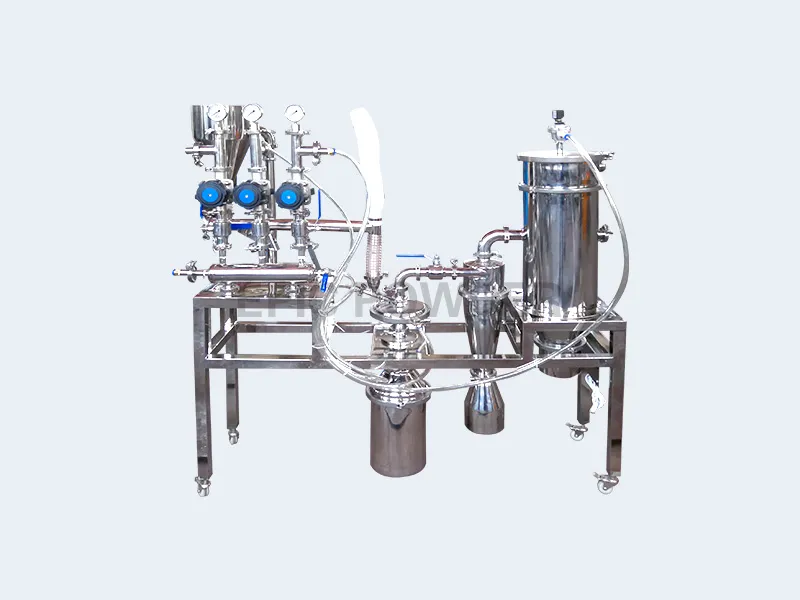
Working principle of spiral jet mill
The jet feeder’s nozzle accelerates the material. It then enters the crushing chamber through the feeding port. Driven by the rotating airflow, it collides, rubs, and shears to be crushed;
The airflow pushes the fine powder to the outlet pipe of the crushing chamber. It then spirals down to the storage hopper in the cyclone separator. The exhaust gas is discharged from the exhaust pipe. The centrifugation throws the coarse particles against the crushing chamber’s walls. This causes cyclic crushing.
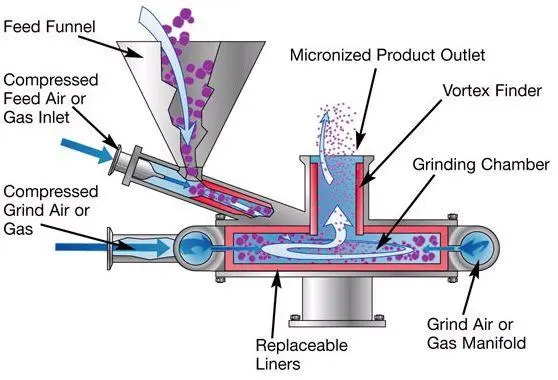
Performance characteristics of spiral jet mill
Advantages: simple structure, easy operation, easy disassembly, cleaning, maintenance, and automatic classification.
Disadvantages: At high speeds, the airflow will collide with the chamber’s inner wall. This causes severe impact, friction, and shearing. It wears the wall of the grinding chamber and creates powder pollution. This is worse for very hard materials, like silicon carbide and silicon oxide.
The grinding chamber’s inner wall should be made of super-hard, wear-resistant materials. For example, corundum, zirconium oxide, and super-hard alloys. A flat jet mill can’t grind ultra-fine, super-hard, high-purity materials.
Fluidized Bed Jet Mill
The fluidized bed collision jet mill uses a counter-spraying principle. It also uses an expanded gas jet flow in the fluidized bed. It excels in energy saving, processing power, and low wear. Its compact, small size and low heat rise are also benefits. It is the most advanced model now.
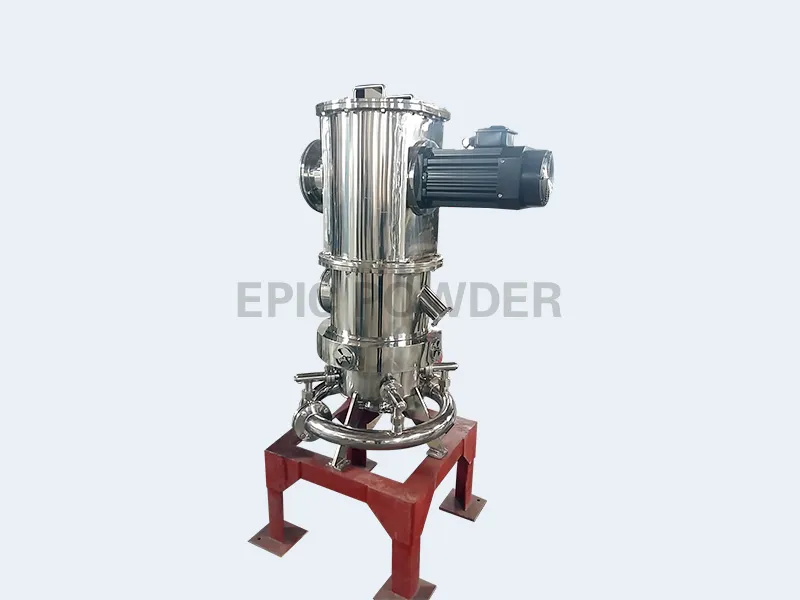
Working principle of fluidized bed jet mill
The material enters the silo through the valve. The spiral sends it into the grinding chamber. Air is sprayed in through the reverse nozzle to fluidize the material.
The accelerated material converges at each nozzle’s intersection. There, the particles collide, rub, and shear each other to be crushed.
The rising air transports the crushed material to the turbine superfine classifier. The fine powder product is discharged through the outlet. Coarser particles return to the grinding chamber along the machine wall. The tail gas enters the dust collector for discharge.
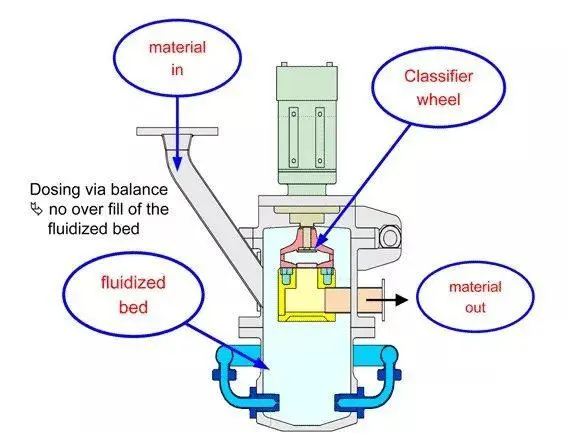
Performance characteristics of fluidized bed airflow mill
Advantages: It has high crushing efficiency and low energy use. The airflow carries particles to collide at multiple angles. The force is large and complex on the powder particles. The powder fully absorbs the added energy. The jet power loss is small. The system combines a fluidized bed with a horizontal turbine superfine classifier. It discharges the fine material in time, reducing energy lost due to over-crushing. The disc-type airflow mill consumes 30-50% less energy on average. High crushing efficiency and low energy consumption.
Light wear and less pollution. After the first impact, the powder particles collide with each other, not the outdoor wall.
The fluidized bed collision jet mill is 10-15% smaller than the disc-type mill at the same capacity. Its footprint is 15-30% smaller.
It has a high degree of automation and low noise. Its high production capacity makes it ideal for large-scale industry.
Disadvantages: The particles continuously impact the grading blades at high speed. When making superhard powder particles, the grading blades wear out quickly. Applications: high-hardness and high-purity materials and tough-to-crush, layered non-metallic minerals. Also, heat-sensitive and densely porous materials.
With the development of modern industrial technology, the requirements for powder performance are constantly increasing. In order to win a larger market, various ultra-fine equipment have emerged. Among them, the jet mill produced by Qingdao Epic Powder Machinery Co., Ltd has a good reputation in the market. If you need purchasing a jet mill, please feel free to contact us.